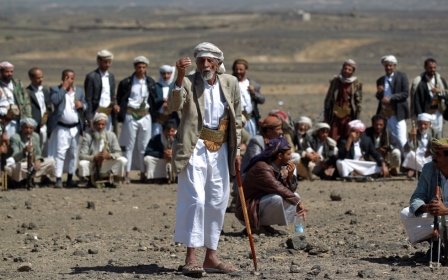Yemen's struggling economy boosted by World Bank grant

The World Bank has announced its largest-ever grant to Yemen, to fund a new highway linking the north and south of the country.
It is hoped that the road will help bring long-term stability to Yemen, amid reports on 4 June of a mass rally in the capital Sanaa to protest against a recent army push in Amran province, where 120 people were reported dead on Monday.
In a statement, the bank explained that over $133m will be granted in support of the government’s plan to build a 710km road, the first of its kind in Yemen.
The World Bank also hopes that the road will provide employment opportunities to 4,000 people, in a country where an estimated 40% of the population are out of work.
Amidst ongoing battles between the army and militants, political unrest and the ever-present spectre of corruption, the World Bank concedes that the planned highway is an “ambitious” venture.
“Increasing need” in 2014
With over 40 percent of Yemen’s population living in poverty, it is hoped that the new road will provide greater political stability.
Yemen has been rocked in recent months by protests against fuel shortages, power cuts and the high cost of living.
In a country where over half of the population are “either hungry or on the verge of hunger”, July will see the World Food Programme embark on a two-year project to improve food security.
The announcement of the $491m programme came after Masood Ahmed, head of the IMF’s Middle East and Central Asia department, warned on 6 May of “increasing need” in Yemen during 2014.
Ahmed urged investment in the country, saying it was in need of “urgent” financial support amid ongoing political instability and a deteriorating security situation.
Challenges for the pipeline
Government corruption risks derailing the highway project and Yemen’s economy, with a 2013 report by the Chatham House think tank identifying corruption as one of the key factors preventing growth.
“Ongoing informal payments, not least from the Interior Ministry”, hinder efforts to spend aid payments effectively.
Among the ministries accused of corruption is the Ministry for Public Works and Planning, which will be responsible for managing the new highway after its completion, expected in three to four years.
In April 2014 a special parliamentary committee revealed corruption by the ministry worth tens of millions of dollars in the financial year 2012 alone, according to Yemeni daily Akhbar al-Yawm.
“The ministry did not use money apportioned to it to implement the investment programme”, reported the committee.
The report also alleges that the ministry, still under the leadership of Omar Abdullah al-Korshomi, misused grants and foreign loans.
A Facebook page set up to fight “all the corrupt practices at the Ministry of Public Works” has over 14,000 Likes.
Challenges for Yemen’s economy
In May, the World Bank’s programme head in Yemen, Wael Zakout, estimated that 70% of Yemen’s official economy is based on oil and gas revenues.
The pipelines have been subject to increasing attacks over the past months, particularly the primary line which brings crude oil from the central governorate of Marib to an export terminal on the Red Sea.
The pipeline was re-opened on 30 May after a stoppage of more than two weeks following the most recent attack by unidentified tribesmen.
Zakout suggested in May 2014 that Yemen’s ailing economy could be boosted by increasing security along the length of the Marib pipeline.
Some questioned the feasibility of upping security around the pipeline, particularly while Yemeni forces are engaged in heavy battles with rebels from the Houthi tribe and militants thought to belong to al-Qaeda in the Arabian Peninsula.
While oil provides 70% of the government's budget, many Yemeni citizens depend on unofficial sources of income, chief among them qat production.
Farmers have increasingly turned to producing the cash-crop, a stimulant widely used throughout the country.
Qat is a much more valuable crop than staples like maize and wheat, according to IPS, and the area of land used to farm it increased by over 200% in the 15 years to 2012, from 80,000 to 250,000.
While it provides good financial yields for struggling farmers, the crop is estimated to use 50 percent more of Yemen’s scarce water resources than cereal crops.
The Yemeni government launched a campaign to eradicate qat in April 2014, and in May an activist told Reuters that 4,500 qat trees had been uprooted in a seven-day period in two neighbouring districts of Ahraz province.
Another unofficial industry in Yemen that faces opposition is lion breeding, a practice that has sprung up to match an increased demand for luxury pets in the Gulf States, according to The Guardian.
Though the Born Free Foundation’s Stephen Brenner reports that there is “low risk of prosecution” for those involved in lion breeding, there are growing calls by animal rights activists for a crackdown on the practice.
Stay informed with MEE's newsletters
Sign up to get the latest alerts, insights and analysis, starting with Turkey Unpacked
Middle East Eye delivers independent and unrivalled coverage and analysis of the Middle East, North Africa and beyond. To learn more about republishing this content and the associated fees, please fill out this form. More about MEE can be found here.




